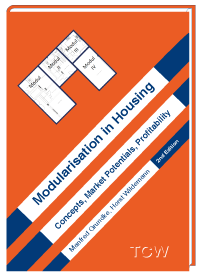
Grundke, Manfred / Wildemann Horst
Erschienen: 2015
2. Auflage
ISBN: 978-3-941967-89-2
- A high variance in efficient and flexible manufacturing
- The reduction of development and planning costs
- The enhancement in quality standards by using ready-to-market modules
- The reduction of error propagation by using proven modules
- The trimming of investment costs for machines and plants
- The improvement of overall production efficiency
- The acceleration of product and procution workflows
- The increase in the quality of manufacturing processes
- The reduction of maintenance expenses
- The improvement of flexibility and adaptability
- The correction of bottlenecks by using continuous improvement methods
The concept of modularization is applied to the product, production, construction and service in the housing construction industry. With the use of prefabricated room modules, benefits such as reduced design and construction costs, savings in procurement and logistics are observed. Also improved startup times and an optimized scalability of the products is seen. The cost efficiencies that are created by an industrial prefabrication, allow the supply of affordable housing and incur, in comparison to conventional constructions, less than half of the cost of production. The modular construction scores particularly highly in quality assurance in production and at the construction site. As a result, a low-cost, rapidly available, individual house with high quality can be created. The application possibilities of modular housing next to the single and multi-family-housing and high-rise constructions are anticipated in renovation and densification or public buildings in the areas of education and health.
